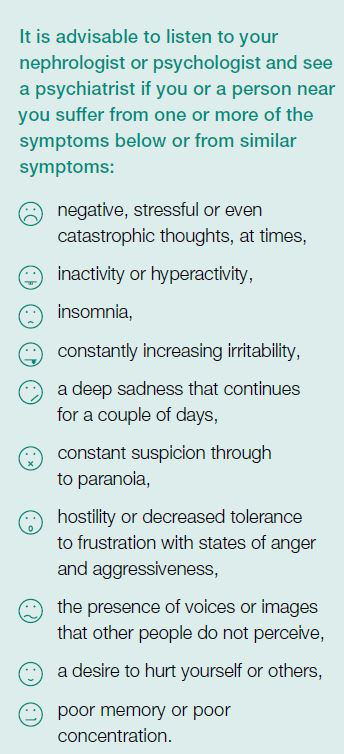Mental health
For 25 years, R. A. has been a patient in the dialysis program of the Nefromed centre in Piatra Neamț, Romania. We want to begin this article with her story. “Five years ago, I fell and fractured my pelvis. I was terrified of being paralysed. My fears intensified to such extent that I was later diagnosed with panic attacks caused by posttraumatic stress. I experienced a variety of symptoms such as anxiety, fear of darkness, fear of loneliness, insomnia, palpitations, hypertension. I also avoided being around other people.
Without cause, I had sudden occurrences of profuse sweating. I had lost my appetite. The fear of going insane was growing, a fear that I felt I could not share with anyone. The state of panic was almost permanent, making it difficult to concentrate. My mind was constantly spinning. After the fracture had healed, I visited different medical practitioners. I went to see a cardiologist, a neurologist, an endocrinologist. I so wanted to get out of this state, I even talked with a priest. The clinic’s psychologist recommended that I see a psychiatrist, but that seemed too strange. A couple of days later, however, walking along a street, I noticed the sign of a psychiatrist’s cabinet. We shared the same first name. I took that as a sign and immediately decided to see a psychiatrist. What can I say? It proved to be the solution to my poor state.
A short while after starting the treatment advised by the psychiatrist, I began to sleep and eat again; I began to feel better and to see life with new eyes. I warmly recommend to anyone going through similar situations not to hesitate and talk to a psychiatrist. It may be difficult to open up at first but I firmly suggest this, because now I understand the importance of psychiatric treatment. Moreover, the psychiatric treatment may consist of just small things, which – like in my case – can make significant changes.”
Mental health can affect physical health
Enjoy the small pleasures of life
Living with a kidney disease means not only coping with the physical symptoms of the illness but also the emotional effects that many arise. Regular treatment results in a more structured week and at times it is necessary to rely on other people like carers and loved ones for support. Adapting to treatment and its side-effects may be uncomfortable, while adjusting to a daily dialysis treatment routine takes time and can lead to some tension.
There are many ways of switching off and restoring balance, be it through hobbies, asking the experts and joining patient organizations.
Family and close friends – a vital factor
Finding something you enjoy
Asking those in the know
References
- Petronela Moroșanu, clinical psychologist and psychotherapist, Nefromed Dialysis Centre, Piatra Neamț, Romania
- Carmen Pop, Patient Care Manager, Fresenius Nephrocare Romania
- Mitrofan, Iolanda – Psihoterapie: Repere teoretice, metodologice si aplicative, Bucharest, SPER Publishing House, 2008








